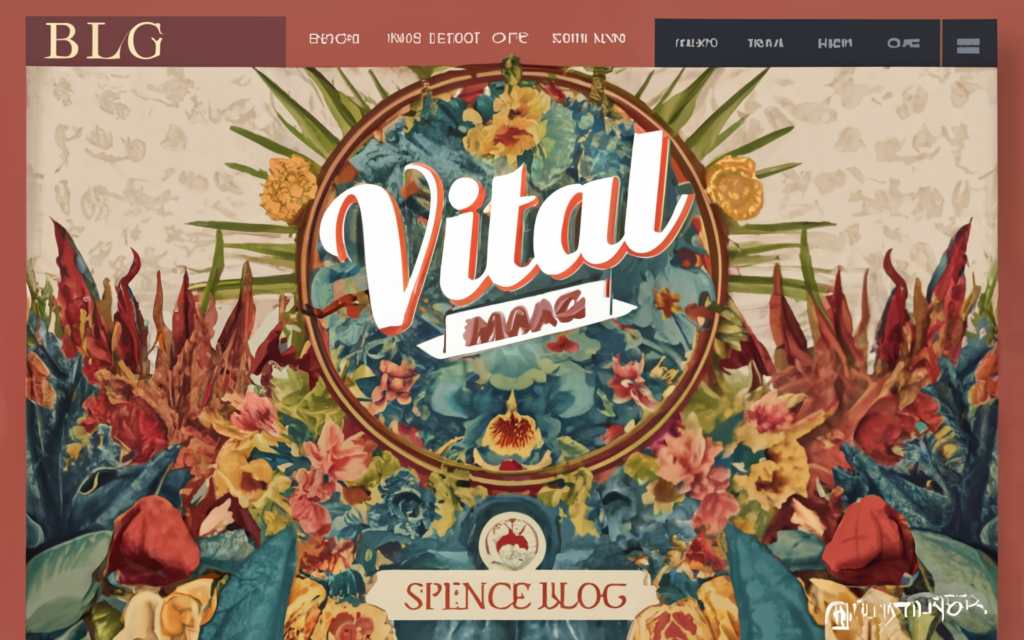The Digital Revolution: Exploring the Impact of Online Magazines and Blogs like the //vital-mag.net blog
In the ever-evolving landscape of digital media, online magazines and blogs have emerged as powerful platforms for sharing information, connecting communities, and shaping public discourse. Among the myriad of digital publications that have sprung up in recent years, the concept of a platform like the //vital-mag.net blog represents the potential for niche content to find its audience in the vast expanse of the internet. This article delves into the world of digital publishing, exploring the impact of online magazines and blogs on modern society, and how platforms similar to the //vital-mag.net blog are changing the way we consume and interact with content.
The Rise of Digital Publishing
The dawn of the internet age brought with it a revolution in how information is created, distributed, and consumed. Traditional print media, once the primary source of news and entertainment, found itself competing with a new breed of content creators who could reach global audiences with the click of a button. This shift gave birth to countless online magazines and blogs, each carving out its own space in the digital realm.
Imagine a platform like the //vital-mag.net blog – it could represent one of the many digital voices that have emerged in this new era. These online publications often start with a simple premise: to provide content that resonates with a specific audience or addresses a particular niche. As they grow, they can evolve into influential platforms that shape opinions and drive conversations on topics ranging from lifestyle and culture to technology and politics.
The Power of Niche Content
One of the most significant advantages of digital publishing is the ability to cater to highly specific interests. Unlike traditional magazines that need to appeal to a broad audience to justify print runs, online platforms can thrive by focusing on niche topics. This specialization allows for deeper, more nuanced coverage of subjects that might not receive attention in mainstream media.
For instance, a blog like the //vital-mag.net blog could potentially focus on a specific aspect of health, technology, or culture that resonates with a dedicated readership. By providing in-depth content on niche topics, these platforms become go-to resources for individuals seeking specialized information or perspectives.
Building Communities Around Content
Digital publications do more than just disseminate information; they create communities. Through comment sections, social media integration, and interactive features, readers can engage with content creators and fellow enthusiasts in real-time. This two-way communication fosters a sense of belonging and can transform passive readers into active participants in ongoing dialogues.
A hypothetical //vital-mag.net blog could serve as a hub for individuals passionate about its focus area, facilitating discussions, sharing experiences, and even spawning real-world meetups or events. This community-building aspect is one of the most powerful features of digital publishing, turning content consumption into a social experience.
The Democratization of Information
Perhaps the most revolutionary aspect of online magazines and blogs is the democratization of information. In the past, the ability to reach a wide audience was limited to those with access to expensive publishing infrastructure. Today, anyone with internet access and a story to tell can potentially reach millions.
This democratization has given voice to underrepresented groups and perspectives that might have been overlooked by traditional media. Platforms similar to what we imagine the //vital-mag.net blog could be might provide spaces for diverse voices to share their experiences, challenges, and triumphs, enriching our collective understanding of the world.
The Challenge of Credibility
With the proliferation of online content comes the challenge of credibility. In a world where anyone can publish, how do readers discern reliable information from misinformation or low-quality content? This question is at the heart of many debates surrounding digital media.
Reputable online magazines and blogs tackle this challenge head-on by implementing rigorous editorial standards, fact-checking processes, and transparency in their reporting. They understand that their credibility is their most valuable asset in an information-saturated world.
For a platform like the //vital-mag.net blog to succeed, it would need to prioritize accuracy, transparency, and quality in its content creation process. This commitment to credibility is what separates enduring digital publications from fleeting online trends.
The Role of SEO in Digital Publishing
Search Engine Optimization (SEO) plays a crucial role in the success of online magazines and blogs. With millions of pieces of content being published daily, ensuring that your articles are discoverable by your target audience is paramount.
Effective SEO strategies involve more than just keyword placement; they require a deep understanding of user intent, quality content creation, and technical optimization of websites. For a blog like the //vital-mag.net blog to thrive, it would need to master the art of balancing engaging content with SEO best practices to ensure visibility in search engine results.
Monetization Strategies in the Digital Age
As online platforms grow in popularity and influence, the question of monetization becomes increasingly important. Unlike traditional print magazines that relied heavily on advertising and subscription models, digital publications have a wider array of options for generating revenue.
These strategies might include:
- Display Advertising: Placing ads within content or in designated areas of the website.
- Sponsored Content: Creating articles or videos in partnership with brands.
- Affiliate Marketing: Earning commissions by promoting products or services.
- Subscriptions: Offering premium content or features to paying members.
- E-commerce: Selling products directly through the platform.
- Events and Workshops: Hosting real-world or virtual events related to the blog’s niche.
A successful online magazine or blog like the //vital-mag.net blog would likely employ a combination of these strategies, tailored to its audience and content focus.
The Impact of Mobile Technology
The rise of smartphones and tablets has further transformed the digital publishing landscape. Mobile devices have become the primary means of accessing online content for many users, necessitating a shift in how content is created, formatted, and delivered.
Responsive design, mobile-first content strategies, and app development have become essential considerations for digital publishers. Platforms that adapt to the mobile revolution, ensuring their content is easily accessible and enjoyable on smaller screens, are more likely to capture and retain audience attention in today’s fast-paced digital environment.
The Future of Digital Publishing
As we look to the future, several trends are shaping the evolution of online magazines and blogs:
- Artificial Intelligence and Personalization: AI algorithms are increasingly being used to tailor content recommendations to individual user preferences, creating more engaging and personalized reading experiences.
- Interactive and Immersive Content: Virtual and augmented reality technologies are opening new possibilities for immersive storytelling and interactive features.
- Voice Search Optimization: With the growing popularity of voice-activated devices, optimizing content for voice search is becoming crucial.
- Blockchain and Digital Rights Management: Emerging technologies like blockchain are being explored for their potential to protect intellectual property and ensure fair compensation for content creators.
- Data-Driven Content Creation: Advanced analytics tools are enabling publishers to make more informed decisions about content strategy based on user behavior and preferences.
- Video and Multimedia Integration: The integration of video, podcasts, and other multimedia elements is becoming increasingly important in engaging audiences and conveying complex information.
- Sustainability in Digital Publishing: As awareness of the environmental impact of digital technologies grows, there’s an increasing focus on sustainable practices in web hosting and content delivery.
For a platform like the //vital-mag.net blog to remain relevant and successful in this evolving landscape, it would need to stay abreast of these trends and continuously adapt its strategies to meet changing user expectations and technological capabilities.
The Role of Social Media in Content Distribution
Social media platforms have become integral to the success of online magazines and blogs. They serve not only as distribution channels but also as spaces for community engagement and brand building. Effective use of social media can dramatically increase a publication’s reach and impact.
Strategies for leveraging social media might include:
- Platform-Specific Content: Tailoring content to suit the unique characteristics of each social media platform.
- Influencer Partnerships: Collaborating with influencers to expand reach and credibility.
- User-Generated Content: Encouraging readers to create and share content related to the blog’s themes.
- Live Streaming: Using live video features to host Q&A sessions, interviews, or cover events in real-time.
- Social Listening: Monitoring conversations and trends to inform content strategy and engage with the audience.
A hypothetical //vital-mag.net blog would likely need to develop a robust social media strategy to maximize its visibility and engage with its audience across multiple platforms.
Ethical Considerations in Digital Publishing
As online magazines and blogs grow in influence, they face increasing scrutiny regarding ethical practices. Key ethical considerations include:
- Transparency: Clearly distinguishing between editorial content and sponsored material.
- Privacy: Respecting user data and adhering to privacy regulations.
- Inclusivity: Ensuring diverse perspectives are represented in content and staffing.
- Fact-Checking: Maintaining rigorous standards for accuracy and correcting errors promptly.
- Accessibility: Making content accessible to users with disabilities.
- Environmental Impact: Considering the ecological footprint of digital operations.
Adhering to ethical standards not only builds trust with the audience but also contributes to the long-term sustainability of the platform.
The Importance of User Experience (UX) Design
In the competitive world of online content, user experience can make or break a digital publication. A well-designed website or app that offers intuitive navigation, fast loading times, and a pleasant reading experience can significantly increase user engagement and retention.
Key aspects of UX design for online magazines and blogs include:
- Clean, Readable Layout: Ensuring content is easy to read across devices.
- Intuitive Navigation: Making it simple for users to find the content they’re interested in.
- Fast Loading Times: Optimizing images and code for quick page loads.
- Responsive Design: Ensuring a seamless experience across desktop, tablet, and mobile devices.
- Accessibility Features: Implementing features that make content accessible to all users, including those with disabilities.
A platform like the //vital-mag.net blog would need to prioritize UX design to create a positive, engaging experience for its readers.
Collaboration and Networking in the Digital Space
The internet has made collaboration easier than ever before, allowing online magazines and blogs to partner with other publications, experts, and creators from around the world. This collaborative approach can lead to richer content, expanded audiences, and innovative projects.
Potential collaborative efforts might include:
- Guest Posts: Inviting experts or influencers to contribute articles.
- Cross-Promotion: Partnering with complementary publications to share audiences.
- Virtual Events: Co-hosting webinars, online conferences, or virtual meetups.
- Collaborative Research: Joining forces with academic institutions or other organizations for in-depth studies or reports.
- Content Syndication: Sharing content across multiple platforms to increase reach.
By fostering a spirit of collaboration, digital publications can create more value for their readers and strengthen their position in the online ecosystem.
The Role of Data Analytics in Content Strategy
Data analytics has become an essential tool for online magazines and blogs, providing insights that shape content strategy, user experience, and business decisions. By analyzing user behavior, engagement metrics, and demographic data, digital publishers can make informed decisions about what content to create, how to present it, and how to monetize it effectively.
Key areas where data analytics can inform strategy include:
- Content Performance: Identifying which types of articles, topics, or formats resonate most with the audience.
- User Behavior: Understanding how readers navigate the site, where they spend the most time, and what leads to conversions.
- Audience Segmentation: Tailoring content and marketing efforts to specific segments of the readership.
- A/B Testing: Experimenting with different headlines, layouts, or features to optimize performance.
- Predictive Analytics: Using historical data to forecast trends and plan content accordingly.
For a blog like the //vital-mag.net blog to thrive in the competitive digital landscape, leveraging data analytics would be crucial in refining its approach and meeting audience needs.
Conclusion
The digital revolution has transformed the way we create, consume, and interact with content. Online magazines and blogs, potentially including platforms like the //vital-mag.net blog, have become powerful forces in shaping public discourse, building communities, and democratizing information. As technology continues to evolve, these digital publications will undoubtedly face new challenges and opportunities.
The success of online magazines and blogs in the future will depend on their ability to adapt to changing technologies, maintain ethical standards, prioritize user experience, and create content that resonates deeply with their audience. By embracing innovation while staying true to the fundamental principles of quality journalism and storytelling, digital publications can continue to play a vital role in our increasingly connected world.
As readers, we have the privilege of accessing a wealth of information and perspectives at our fingertips. It’s up to us to engage critically with this content, support quality digital journalism, and contribute to the vibrant ecosystems that online magazines and blogs have created.
The story of digital publishing is still being written, and platforms like what we imagine the //vital-mag.net blog could be are at the forefront of this ongoing narrative. As we look to the future, one thing is certain: the digital landscape will continue to evolve, offering new and exciting ways to share stories, connect communities, and shape our understanding of the world around us.
FAQs
What exactly is the //vital-mag.net blog?
The //vital-mag.net blog is a hypothetical example used in this article to illustrate concepts related to online magazines and blogs. It doesn’t refer to a specific existing blog, but rather serves as a representation of digital publishing platforms in general.
How do online magazines differ from traditional print magazines?
Online magazines offer greater flexibility in content delivery, real-time updates, interactive features, and the ability to reach a global audience instantly. They also typically have lower overhead costs compared to print publications.
Are online blogs and magazines credible sources of information?
The credibility of online publications varies widely. Reputable blogs and magazines maintain high editorial standards, fact-check their content, and provide transparent sourcing. Readers should always critically evaluate the credibility of online sources.
How do online magazines make money?
Online magazines can generate revenue through various methods including display advertising, sponsored content, affiliate marketing, subscriptions, e-commerce, and hosting events or workshops.
What role does SEO play in the success of online publications?
SEO is crucial for online publications as it helps their content become more visible in search engine results, driving organic traffic to their site. Effective SEO strategies can significantly increase a publication’s readership and influence.
How has mobile technology impacted digital publishing?
Mobile technology has made content more accessible on-the-go, leading to changes in content formatting, design approaches (like responsive design), and consumption patterns. It has also opened up new opportunities for location-based and personalized content.
What ethical considerations should online publications keep in mind?
Key ethical considerations include transparency about sponsored content, respect for user privacy, commitment to accuracy and fact-checking, inclusivity in perspectives and staffing, and environmental responsibility in digital operations.
How can online magazines and blogs build a community around their content?
Community building can be achieved through interactive features like comments sections, forums, social media engagement, live events (virtual or in-person), and creating content that encourages reader participation and discussion.
What future trends are shaping digital publishing?
Emerging trends include AI-driven personalization, interactive and immersive content experiences, voice search optimization, blockchain for rights management, data-driven content creation, and increased focus on video and multimedia integration.
How important is user experience (UX) design for online publications?
UX design is crucial for online publications as it directly impacts reader engagement and retention. A well-designed, intuitive, and accessible website or app can significantly enhance the reading experience and keep users coming back for more content.





